1. Success story on horizontal expansion of Toria at NICRA village of Dibrugarh district of Assam
Problem Identified: Lezai Miripathar Gaon and Janjimukh village, located near the river Burhidihing, under Barbarua block of Dibrugarh district are chronically affected by flood every year. Both villages are inundated by the water of Burhidihing, Sesa river and the backflow of mighty Brahmaputra. In recent times, the village experienced major flood in 2002 and 2016 with severe loss to crop and live-stock. Recurrent flood not only causes damage to winter rice but also delays the sowing of toria resulting in its low production. On the other hand, production of local cultivars of toria being traditionally cultivated here is also low.
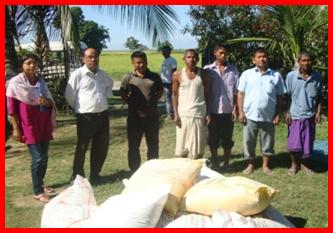
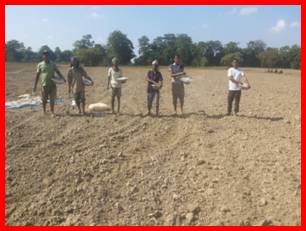
Technology injected: Demonstration on high yielding toria TS-36 through its introduction in 2014-15 in 26 ha area using seed treatment with biofertilizers Azotobacter and PSB as a part of INM practice (75% RD of fertilizers and 25% biofertilizers). The demonstration was conducted in 4 locations covering 46 farmers by sowing on 12-14th November, 2014. Detail is shown below
| Location | Area (ha) | Yield (q/ha) |
| I | 12.5 | 11.5 |
| II | 5.5 | 14 |
| III | 2 | 12 |
| IV | 6 | 12 |
Location-I is a sand and silt deposited area near the river Burhidihing and had consistent low yield. Moreover, moisture stress was also a critical problem as observed in this location. Due to the natural slope in topography of the toria-field water drains off quickly with the drying of the river. Therefore, in next year farmers of this location were motivated for an early sowing. Accordingly the sowing was done on 2nd and 3rd November that resulted remarkably a better harvest. Harvesting was done in 2nd week of February, 2015 i.e. well ahead of pre-monsoon shower. The average yield was recorded to be @13.22 q/ ha
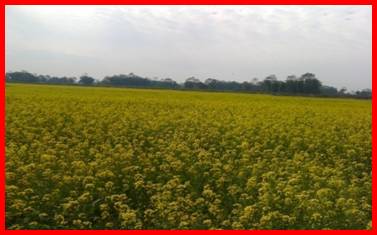
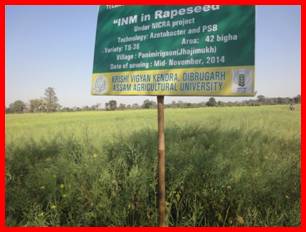
| Sowing time | Before intervention | After intervention |
| Toria sown from 15th Oct-15 th Nov | 8.00 q/ ha | 14.18 q/ha with TS -36 and TS-38 |
| Toria sown upto 2nd week December | 7.00 q/ ha | 10.25 q/ha with TS - 67 |
Horizontal expansion of TS-36 and TS-38: In 2015-16, good number of (49) farmers came forward and procured seed of these introduced varieties of toria from the fellow farmers who had cultivated it in previous year. Thus, the variety introduced by KVK, Dibrugarh spread to 49 new farmers next year who cultivated it at their own without any inputs from KVK, except the technology. Besides this, KVK also demonstrated TS-38, another high yielding toria, in additional 15 ha area for upscalling the activity under normal FLD programme. Average yield went up to a tune of 14.18q/ ha of this intervention. Moreover in 2015-16 another late sown toria varietiy (TS-67) was demonstrated in 9 ha under rice-toria sequence after harvesting of long duration winter paddy by the end of November.
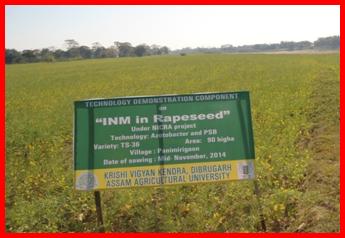
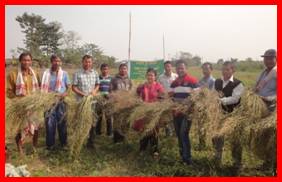
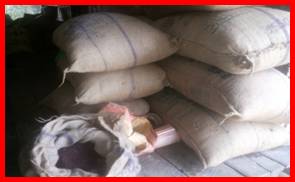

Advantage of TS-67:
This variety has wider sowing window. Normal-sown toria variety (TS-36, TS-38) cannot be sown in December. However, theis variety can be sown upto 2nd week of December after harvesting of winter rice with comparatively higher yield and thereby helps in double cropping and increasing cropping intensity too. In 2016-17, in another 10 ha area TS-67 was demonstrated by KVK for upscalling of this variety in rice toria sequence.
By 2016-17 about 100 ha area in these two villages was covered under toria cultivation. To show its replication, a programme was organized in these villages on 23rd December, 2016 under “Technology Week” celebrated from 23rd to 30th December, 2016 at different places of Dibrugarh district inviting different line departments and was telecasted through AIR and DDK, Dibrugarh. Yellow revolution in real sense has taken place in these two villages within three years.
Acknowledgements: All authors of this story are highly thankful to CRIDA, Hyderabad for providing financial support through NICRA and all other esteemed person from The Directorate, ATARI, Zone-III, ICAR and Directorate of Extension Education, AAU, Jorhat for providing necessary facilities for smooth implementation of the project.
#####
2. Solar cum Electrical fencing – a pioneering introduction for multi-cropping
Mr. Babua Ram Taye of Panimiri gaon of Barbaruah block of Dibrugarh was basically a school teacher and after retirement on 2005 he started agriculture in his 15 hectors of land that he inherited from his father. However, he could not get good result, because of being the area chronically and recurrent flood affected by three nearby rivers namely mighty Brahmaputra, river Burhidihing and also another tributary named Sessa. Moreover due to bad practice of let loosing of the livestock immediately after harvesting of kharif paddy no cultivation during other season is possible at all. Pertinent to mention over here that free grazing of livestock, particularly in all districts of Upper Assam, immediately after harvesting of kharif paddy is a common practice and cause massive damage during other season (except Kharif) of the year. Under that situation even interested farmers of any village cannot grow any crop. Being an innovative farmer, Mr B. R. Taye was searching for an alternative to combat with the situation that how he can grow more crops round the year.
 |
 |
| Solar Fencing | |
Infusion of technology: Finally in the year 2011-12, Mr. Taye purchased one electrically operated machine, which can effectively be used for passing of current through iron wire and that way it can be effectively used as fencing to protect the crop from livestock. The machine is also fitted to a battery so that without electricity battery can supply electricity upto 16-18 hours. The uniqueness of the fencing is that electricity does not pass continuously because of which animals get intermittent shock but do not get killed. The total cost of the machine including required bamboo post and iron wire is almost Rs. 40,000.00 and can cover about 20 ha area. Next year he got the information of another completely Solar operated machine to cover more area at a time. Immediately he purchased one purely solar operated machine with a total installation cost of Rs. 1,20,000.00 to start a new farm in nearly 45 ha another land, where he is now cultivating Potato, cauliflower, broccoli, tomato, pumpkin, brinjal, banana, sugarcane and oilseed toria. No extra cost of the both the equipments have been incurred till date. With this fencing in 5 ha land he was cultivating more than one crops round the year viz. winter paddy followed by Boro or Ahu (Summer) paddy. Seeing his idea another 4 farmers have purchased that equipment for installing in their field too. That way the equipment is becoming popular in many parts of the district. Mr. Taye also helps in getting the machine to other needy person.
KVK-Intervention: Seeing his idea for protecting crop from livestock by electrical/ solar operated fencing KVK-Dibrugarh came to his contact in the year 2013-14. KVK Dibrugarh introduced two high yielding submergence tolerant rice varieties Jalashree and Jalkunwari during kharif season, high yielding normal sown toria varieties TS-36 and TS-38 and late sown toria variety TS-67 in rice-toria sequence and short duration (90-100 days) Early Ahu (Summer paddy) varieties Dishang and Kallang. That way with the technical guidance of KVK he could be able to introduce three crops (Kharif paddy-toria-summer paddy) and thereby enhancing cropping intensity by 200%. However, the cropping intensity could never been enhanced without the use of fencing to protect the crops from stray animals. The expenditure per ha area in both the equipments comes to only Rs. 150.00 if we consider that life span of the entire implements including cost of machine, bamboo post, iron wire etc is five years. If it can run more than 5 years than naturally cost will be very much negligible and even less than that of bamboo fencing. Moreover with one large machine more than 5 km running distance or approximately 150 ha compact area may be covered. With this type of machine cropping intensity can be enhanced by 200-300%. Therefore, this machine may also be supplied to farmers in cluster approach by other govt. agencies.
 |
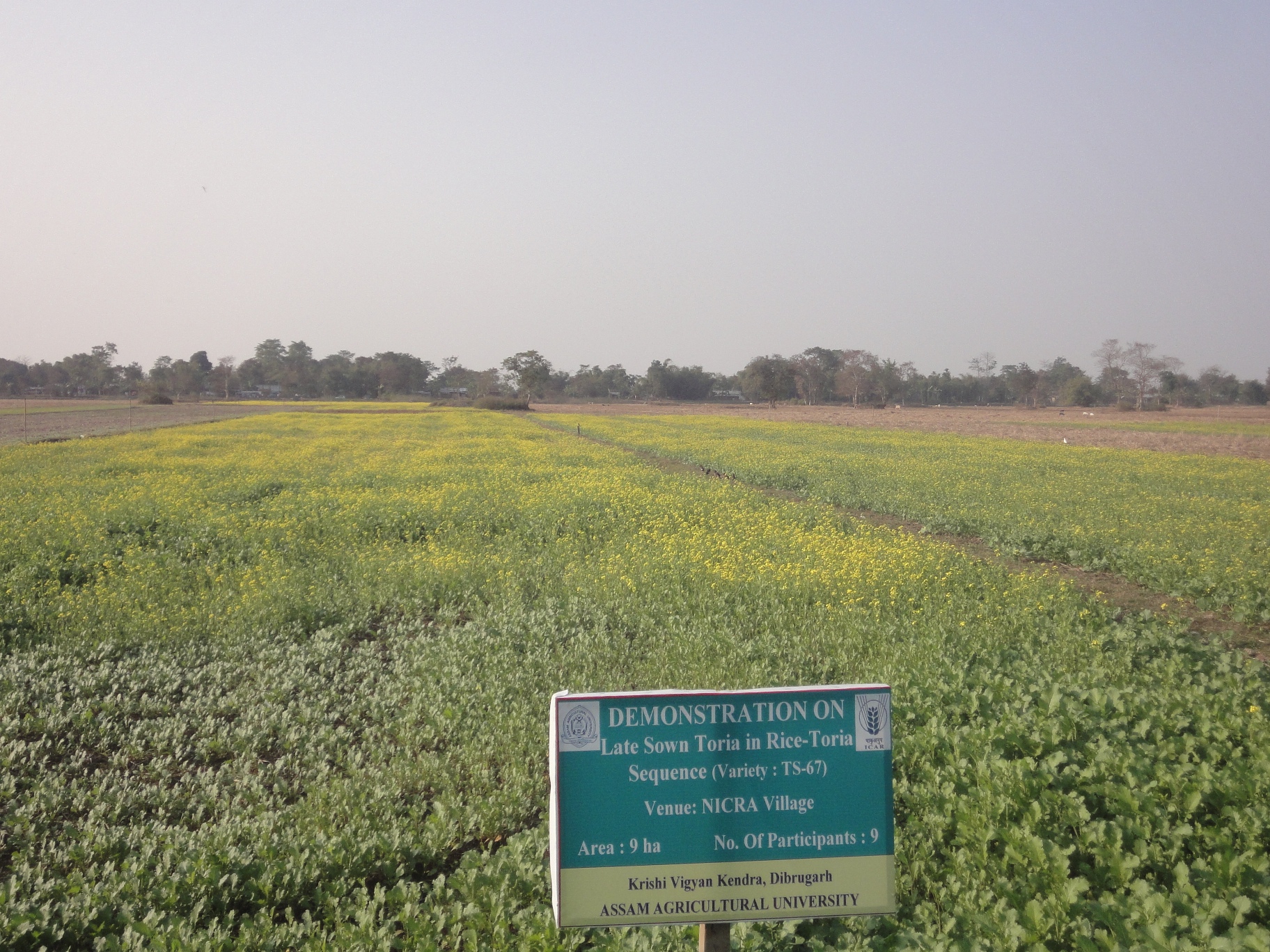 |
| Short duration Ahu rice Dishang and kapilee | Late sown Toria TS-67 in rice toria sequence |
Horizontal Expansion: Mr. Taye has supplied this machine to nearly 10 farmers of the district till date. Under the technical guidance of KVK-Dibrugarh, Mr. Taye has spread the cultivation practices of high yielding submergence tolerant winter rice varieties Jalashree and Jalkunwari, high yielding normal sown toria varieties TS-36 and TS-38 and late sown toria variety TS-67 and short duration (90-100 days) Early Ahu (Summer paddy) varieties Dishang and Kallang to nearly 50% farmers of the village. Mr. Taye has been providing direct employment to twenty families in his farm, which is the very big achievement for a marginal farmer.
#####
3. A SUCCESS STORY OF A PROMISING FARMER OF DIBRUGARH
Introduction:
 The story is all about of an enthusiastic, energetic person who is dedicated to farming and becoming an example of many farmers of Dibrugarh district, Assam. He is Mr. Dalim Gogoi of Lengrai Tinkuria village, Tengakhat, Dibrugarh. Mr. Gogoi has been involved in farming for more than 20 years. Initially, due to lack of knowledge on modern agriculture he could not progress as expectation. However, in last few years agriculture has changed his livelihood. Previously he lived in katcha house, which has now turned to a concrete one. Farming is in his blood from childhood, but he started bringing his association with farming with more meaningful way in terms of time, dedication and scientific attitude from last few years only. Although he was initially involved with District Agricultural office, he started visiting to the KVK from 2009 onwards for consulting with the scientists for seeking solutions of the problems he had faced in his farm. This way, knowingly or unknowingly, science percolated down to his mind and farming.
The story is all about of an enthusiastic, energetic person who is dedicated to farming and becoming an example of many farmers of Dibrugarh district, Assam. He is Mr. Dalim Gogoi of Lengrai Tinkuria village, Tengakhat, Dibrugarh. Mr. Gogoi has been involved in farming for more than 20 years. Initially, due to lack of knowledge on modern agriculture he could not progress as expectation. However, in last few years agriculture has changed his livelihood. Previously he lived in katcha house, which has now turned to a concrete one. Farming is in his blood from childhood, but he started bringing his association with farming with more meaningful way in terms of time, dedication and scientific attitude from last few years only. Although he was initially involved with District Agricultural office, he started visiting to the KVK from 2009 onwards for consulting with the scientists for seeking solutions of the problems he had faced in his farm. This way, knowingly or unknowingly, science percolated down to his mind and farming.
KVK-Intervention: Under the banner of KVK, Dibrugarh he participated many trainings, exposure visits to premier agricultural institutes. He was sent by KVK-Dibrugarh, Assam Agricultural University for participation in the ‘Agricultural Technology showcasing meet’ held at ICAR Research Complex, Patna, 6th-7th December, 2013. Because of his scientific temperament, the scientists of KVK selected him as a beneficiary of some OFTs and FLDs at initial stages. Good to say that he reciprocates to the scientists’ advices promptly and follows it to the extent possible with his available resources. He cultivated mid-duration rice varieties like TTB-404 and Mulagabharu, developed by Assam Agricultural University, in 2012-13 as demonstrated by Krishi Vigyan Kendra, Dibrugarh in his field followed by cultivation of Toria (variety: TS-36) in the same piece of land, where he could not grow two crops earlier due to adoption of long duration rice variety; thus he could be able to increase the cropping intensity too. He has also started cultivation of high valued, most preferred local scented rice (Local name: Kon Joha, Kola Joha) using Azolla for nitrogen supplementation. Now he is in a position of supplying quality seeds of Rice and Toria produced at his own field to other farmers of the district. Moreover, he started production of vermicompost in 2012 under one OFT as a part of the organic input production and was expanded to 6 units by 2016-17. In 2015-16 he developed a small fishery unit too for production of Fingerling of major carps.
 |
 |
| Vermicompost Units | |
Impact of KVK interventions:
By selling vermicompost he earns a handsome amount of more than Rs. 1.00 lakh/ year. From small fingerling production unit, he is earning more than Rs. 1.00 lakh/ year (Rs. 4-5/ fingerling). Following his intervention now he has been able to increase his earning from Rs. 75,000.00 in 2009 to more than Rs.4,00,000.00 in 2016. This is really a good example for every farmer. It is a matter of joy for farmers of Tengakhat area that a farmer from their area, Mr. Dalim Gogoi got the award of “Third best farmer of Dibrugarh district in 2012”. Recently he was felicitated with a Rs. 50,000.00 from Chief Minister of Assam on 27th January, 2017 as a progressive farmer from Dibrugarh at Farmer’s Rally held at Darrang district of Assam. We pray to the almighty for his better health and success in future.
Horizontal Expansion: Mr. Gogoi has replicated technology of Azolla for nitrogen supplementation, mid duration winter paddy variety Shravani and Mulagabharu, staggered planted winter paddy Gitesh, toria variety TS-36 and vermicompost production to other six fellow farmers.
#####
4. Success story of an organic tea grower group of Dibrugarh: Prithvi group – a SHG of Tingkhong involved in organic tea production.
Introduction: Normal handmade tea is very cheap and is sold at Rs. 150.00 to Rs. 200.00 per kg. However, rate of organic tea in local and international market is quite high. Although, many tea growers or other agencies frequently demand that are producing the product through organic way, but in most cases they fail to fulfill the customer’s demand upto expectation. Production of handmade organic tea requires dedication, technical skill and above all is the patience and incessant efforts. This story tells about the success of a tea grower group who are incessantly working in quality organic tea production and marketing.
 |
|
| Organic Certificate | |
KVK-Intervention: Ten (10) numbers of small tea growers of Tingkhong area of Dibrugarh had been showing interest in organic tea production for last few years and approached KVK to guide them in this regard in 2012-13. Previously before coming in contact with KVK they were using cowdung, neem leaves, cow and goat urine etc besides some chemical fertilizer too in judicious way. These people were already producing quality handmade orthodox tea. Seeing their interest a group (SHG) comprising of 11 tea growers were formed and trainings were given to them from KVK along with necessary guidance, plant protection measures, nutrient managemental aspects and other corrective measures to be adopted in their garden by them. After getting training they started to use other bio/ organic inputs like vermicompost, supercompost, Azotobacter, PSB, Trichoderma etc in their field. There after they started producing handmade orthodox black and handmade green tea. Few months later they were linked by KVK-Dibrugarh with one certified company namely “One Cert Asia” for certification of the products. As per their protocol, samples were first sent to the Tocklai Tea Research Station, Jorhat (TRA, Jorhat) on request through KVK for analysis of pesticide residue. Samples were passed in pesticide residue analysis test. The experts from the company visited their field and satisfied with sorts of measures they were applying. Seeing their progress the company agreed to provide certification for this group for the first year. By 2016-17, 3 years have been completed and now the group is producing and selling handmade “ORGANIC BLACK” and “ORGANIC GREEN” tea under the certification no ORG/SC/1312/001 631 A.
Impact of KVK interventions: Prithvi group is now supplying teas to many parts of the country. At present they are selling @ Rs 1500.00-2000.00/ kg for organic black tea and Rs. 2000.00-2500.00/ kg of organic green tea and thus earning has increased by 10-15 times. Previously they were selling handmade tea only @ Rs. 200.00- 250.00/ kg only. Seeing their success other persons from nearby area were also attracted to them.
Horizontal expansion: Now this group is expanding day by day by incorporation of few new members. As per the last report of December, 2016 it was known that now this group has 30 numbers of members. The members of the group are also participating in various exhibitions of the district, state Assam and other states of the country. They have taken handsome training under many renowned institution including Assam Agricultural University, TRA, Tea Board etc. We feel great pleasure when farmers can do some wonder by adopting good technological interventions. Now Prithvi group is ideal to many small tea growers of the district.